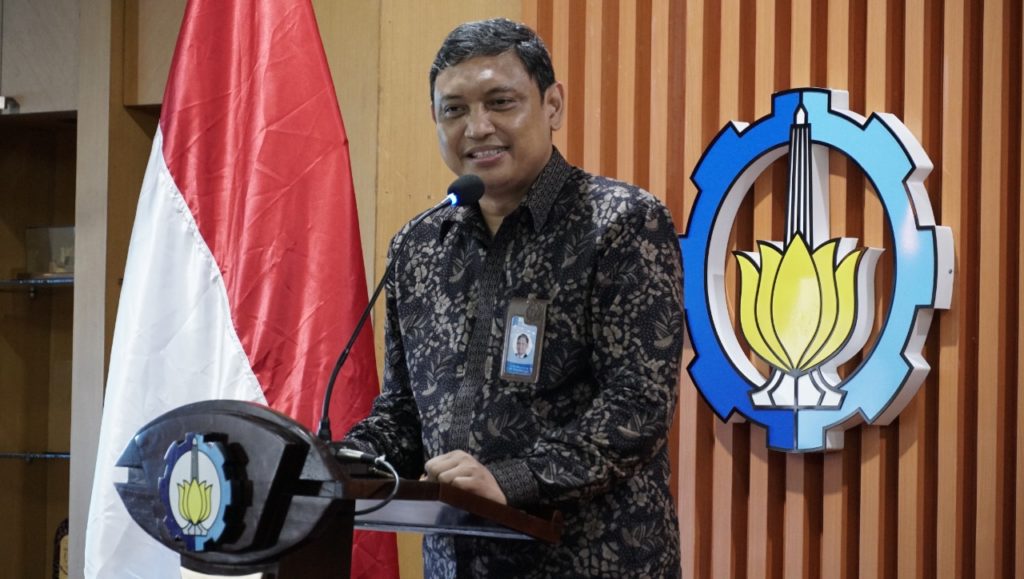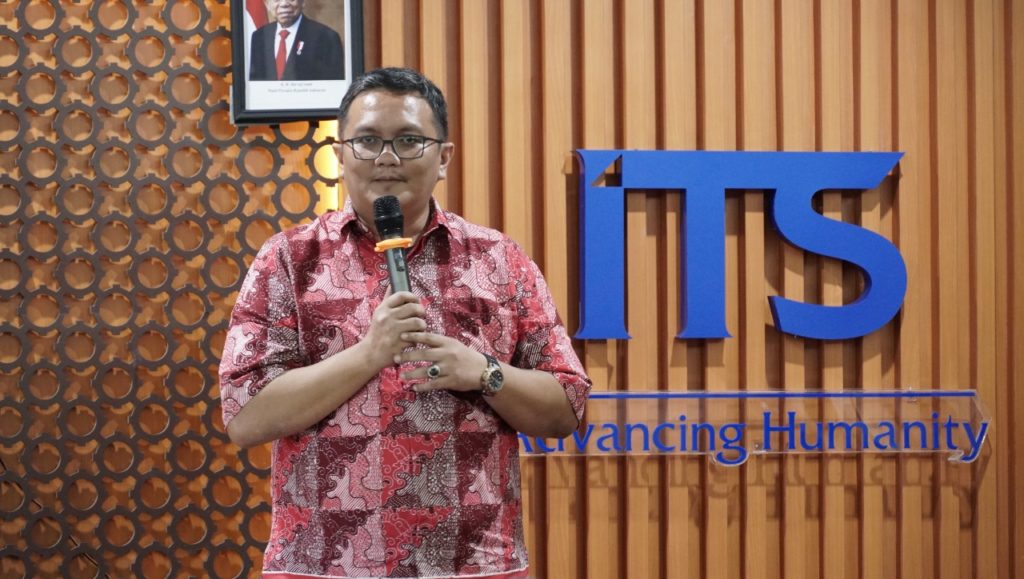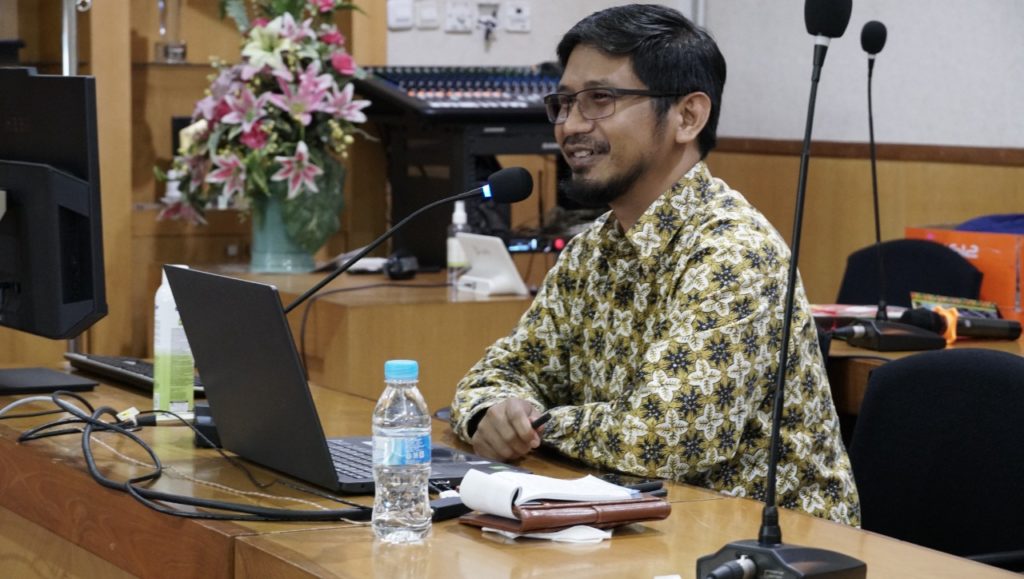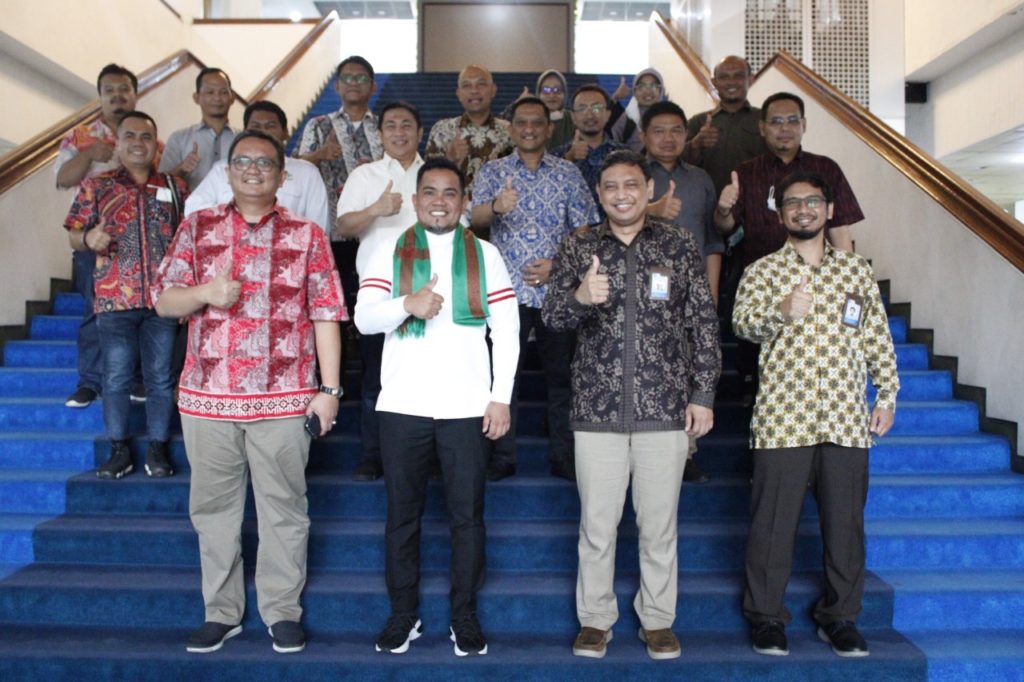ITS Together with Apkasindo Initiate Downstreaming of Palm Oil Technology

Speech and brief presentation of ITS profile by ITS Director of Business Cooperation and Management (DKPU) Tri Joko Wahyu Adi ST MT PhD
ITS Campus, ITS News – Responding to the policy issue of the ban on the export of Crude Palm Oil (CPO) and its derivative products related to the oil palm Fresh Fruit Bunches (FFB) trade system, Institu Teknologi Sepuluh Nopember (ITS) together with Indonesian Palm Oil Farmers Association (Apkasindo) signed a Memorandum of Understanding (MoU) to voiced the social issue, Thursday (2/6). In this case, we discuss the elaboration to downstream innovation with the concept of a new breakthrough in palm oil processing technology.
Located in the Senate Meeting Room of the ITS Rectorate Building, this MoU activity was attended by the ITS Director of Business Cooperation and Management (DKPU) Tri Joko Wahyu Adi ST MT PhD along with the ranks of the ITS Directorate of Research and Community Service (DRPM), the Central Leadership Council (DPP) Apkasindo Ir Wrestling Gold Medal Manurung MP accompanied by Secretary General Rino Afrino ST MM. In addition, the Regent of Pelalawan Regency Government (Pemkab) Zukri Misran and the ranks of the Riau Provincial Office were also present.

Remarks from the DPP representative of the Indonesian Palm Oil Farmers Association (Apkasindo) by the Secretary General of Apkasindo Rino Afrino ST MM
In his remarks, Tri Joko responded well to the offer of technological innovation cooperation in the palm oil sector for the development of Micro, Small and Medium Enterprises (MSMEs), plus it will be applied in the oil palm forest area, Pelalawan Regency, Riau. Seeing the potential that exists, he added that this is in line with the development of innovation at ITS, especially in the center of excellence for science and technology (science and technology).
Furthermore, ITS also offers to develop research and innovation with a wider scope, such as cities to provinces which will be supported by 10 innovation research laboratories and four technology industrial clusters at ITS, namely automotive, maritime, robotics, and creative digital industries. “If there will be a big collaboration in the future, it is hoped that there will be a big change for the world and the supporting agencies for oil palm farmers,” he said proudly.

Discussion sessions related to renewable technological innovations of palm cooking oil led by the ITS Directorate of Research and Community Service (DRPM)
On the DPP Apkasindo side, this innovation downstream activity is considered by Rino as a form of anticipation to the government which has so far assessed the pricing of oil palm FFB regulated in the Minister of Agriculture Regulation (Permentan) No. 1/2018 is not fair. Because the regulated FFB price is only intended for farmers who partner with companies. “In fact, the number of farmers who partner with companies is only 7 percent, while the other 93 percent are independent oil palm farmers,” he said.
With these problems and considering that oil palm land owned by independent smallholders and cooperatives reaches 42 percent of the total 16 million hectares, Rino said that he would build his own factory with an estimated production capacity of 15 tons per hour. In fact, the production plant in Pelalawan Regency, Riau, has a capacity of 30 tons per hour, with a land area of 7,000 hectares.
Thus, he added, independent smallholders are no longer dependent on various palm oil mills owned by large corporations. Apkasindo and ITS have a lot of potential that can be developed so that farmers can also advance to class. “Not only that, we also really support agencies that support the procurement of cooking oil by providing capital of around Rp. 100 billion,” he said.
The project, which will be worked on by ITS lecturer Prof. Setiyo Gunawan ST, PhD, will develop a renewable cooking oil purification technology using the Batch-wise Solvent Extraction method. This method has been proven to be safer and simpler because it replaces the functions and stages of degumming, neutralization and bleaching in the existing methods. Not only that, the burden of the deodorization process is lighter because it uses a lower temperature for its operation.

ITS leaders together with a delegation from the DPP of the Indonesian Palm Oil Farmers Association (Apkasindo) and the Pelalawan Regency Government, Riau
For example, one kilogram of palm oil will produce free fatty acid (FFA) compounds and other impurities which will dissolve in methanol solvent and collect in the polar liquid fraction (PLF). With the Batch-wise Solvent Extraction method which increases the number of stages of the process, palm cooking oil refining can be increased from 78 percent to 91.46 percent in stage one and to 98.5 percent in stage eight.
From the signing of the MoU which was followed by a discussion session, both parties hoped to realize a pilot project for the development of the smallholder palm oil industry in the coming years. Namely as an effort, among others, to develop palm oil as a solution to overcome the problem of availability and price of cooking oil and the independence of oil palm farmers to have a bargaining position in the palm oil industry. (AJ/ITS Public Relations)
Reporter: Fauzan Fakhrizal Azmi
Related News
-
ITS Lecturer Introduces Madurese Culture to the International Stage
ITS Campus, ITS News — Continuing to show local wisdom to the world community, this time a lecturer from the Department
June 03, 2022 15:06 -
ITS Researchers Remind TKDN is Crucial for Economic Independence
ITS Campus, ITS News — The Domestic Component Level (TKDN) is the key to restoring the glory of the Indonesian
June 03, 2022 15:06 -
Strengthening Quality Education, ITS Professor Develops Adaptive Technology for Students
ITS Campus, ITS News — Differences in students’ abilities in understanding lessons are often a challenge for teachers in the classroom.
June 03, 2022 15:06 -
ITS Graduates Create Reverse Logistics Model for PET Plastic Waste Recycling
ITS Campus, ITS News — Doctoral graduate from the Department of Industrial and Systems Engineering, Sepuluh Nopember Institute of Technology (ITS) Dr. Yuniar
June 03, 2022 15:06
